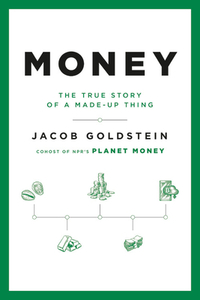Take a photo of a barcode or cover
It's the Planet Money podcast, in book form! Entertaining and educational.
informative
medium-paced
I love the Planet Money podcast, and am more than happy to support it by buying this book. More than that, this book is generally interesting, getting into the history of currency and finances from early history up to Bitcoin. Definitely worthwhile!
informative
medium-paced
An enjoyable light read of vignettes on the history of money.
Also some of the best descriptions of what "money supply" means for people who don't know finance. Definitely recommended.
Also some of the best descriptions of what "money supply" means for people who don't know finance. Definitely recommended.
I really enjoyed this book. I am always curious why economics and finance need to be studied. We created it, so shouldn’t we understand it? A million times no! And Goldstein shared several tales that explained some of the complexities of our monetary system. And it was also fun to hear the real story behind the Luddites. Entertaining and informative.
Well, we all know money doesn't grow on trees, it doesn't seem to grow anywhere, which is why we have to make it, then suggesting that it is a made up thing, just as the title says! This book is chock full of interesting facts, people and history about where money came from, how it originated and came to be this essential all-encompassing thing it is today, making our world go round, it not being love after all. I enjoyed it immensely, but I did have a feeling of disconnect with it which I couldn't really put my finger on. The book bounced around all over the place, and gave an overall picture of what this made up thing is, but there wasn't much depth to it all. I wanted to know more, and on reading some of the GR reviews it seems I am not the only one. Other readers put this down to the author's gift as a podcaster not transferring so well to being a writer. I can imagine him delivering these chapters in a pod cast way - they would be great - entertaining, interesting, scattershot. But not so much for a 'speak to the reader' way of each chapter moving smoothly into the next. I also felt he was trying to be a bit like Malcolm Gladwell in his writing style, but it just does not quite hit the mark. Perhaps too much information and not enough expanding on some of the important ideas he presents?
Despite this, I did enjoy what he had to say very much. I got a bit bogged down with the gold standard, and central bank theory, but there is plenty more to enjoy and learn from. Much of this of course is basic economics as societies grapple with how to place value on stuff. He takes us back to the ancient Greeks where it all began, the sophistication of China before the Europeans arrived on the scene, the early European economists and mathematicians who tried to make sense of the chaos brought about by expanding empires, then the industrial revolution. I particularly enjoyed the sections on how the Great Depression occurred, and the GFC of not that long ago. His explanations of these I thought were good, possibly over simplistic but when you aren't an economist or a mathematician, simple is good.
Despite this, I did enjoy what he had to say very much. I got a bit bogged down with the gold standard, and central bank theory, but there is plenty more to enjoy and learn from. Much of this of course is basic economics as societies grapple with how to place value on stuff. He takes us back to the ancient Greeks where it all began, the sophistication of China before the Europeans arrived on the scene, the early European economists and mathematicians who tried to make sense of the chaos brought about by expanding empires, then the industrial revolution. I particularly enjoyed the sections on how the Great Depression occurred, and the GFC of not that long ago. His explanations of these I thought were good, possibly over simplistic but when you aren't an economist or a mathematician, simple is good.
I loved this book. It was a well written, fascinating insight into something we can all relate to.
Rating: 3.5/5
"Money: The True Story of a Made-Up Thing" is a compelling journey through the evolution of money, offering a balanced and accessible narrative that is as educational as it is engaging. The author skillfully escorts the reader from the inception of physical currency to the modern era of cryptocurrencies, weaving a tapestry that is rich in historical context and brimming with insight.
The book's strength lies in its ability to demystify complex financial concepts and present them in a manner that is easily digestible. It not only provides a plethora of answers to pressing questions about the nature and function of money but also ignites curiosity, prompting further inquiry into the broader economic implications of our financial systems.
What stands out is the author's adeptness at balancing factual rigor with engaging storytelling. This combination makes the book an excellent resource for anyone with an interest in finance, whether you're a seasoned economist or simply curious about the financial world.
In summary, "Money: The True Story of a Made-Up Thing" is a fascinating exploration of the concept of money, its historical evolution, and its impact on society. It's a must-read for anyone fascinated by the intersections of history, economics, and finance. While it leaves the reader with more questions than answers, it serves as a testament to the complexity and intrigue of the financial world, encouraging further exploration and understanding.
"Money: The True Story of a Made-Up Thing" is a compelling journey through the evolution of money, offering a balanced and accessible narrative that is as educational as it is engaging. The author skillfully escorts the reader from the inception of physical currency to the modern era of cryptocurrencies, weaving a tapestry that is rich in historical context and brimming with insight.
The book's strength lies in its ability to demystify complex financial concepts and present them in a manner that is easily digestible. It not only provides a plethora of answers to pressing questions about the nature and function of money but also ignites curiosity, prompting further inquiry into the broader economic implications of our financial systems.
What stands out is the author's adeptness at balancing factual rigor with engaging storytelling. This combination makes the book an excellent resource for anyone with an interest in finance, whether you're a seasoned economist or simply curious about the financial world.
In summary, "Money: The True Story of a Made-Up Thing" is a fascinating exploration of the concept of money, its historical evolution, and its impact on society. It's a must-read for anyone fascinated by the intersections of history, economics, and finance. While it leaves the reader with more questions than answers, it serves as a testament to the complexity and intrigue of the financial world, encouraging further exploration and understanding.
informative
fast-paced
Goldstein's discussion of the history of money from ancient Mesopotamia to Bitcoin, is readable and accessible to nonexperts. Written in a tongue-in-cheek, chatty style, Goldstein packs his book with rich details and colorful characters from the history of money. While much less academic than Martin's Money or Graeber's Debt, Goldstein's book draws on a lot of the research and ideas in those denser discussions, adds his own spice to the narrative, and serves up a fun and digestible popular history.




